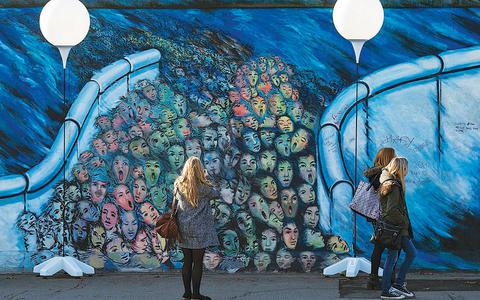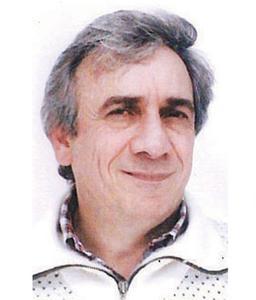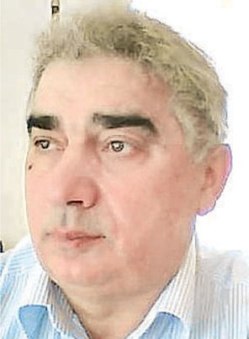photos www.ethnos.gr, www.tovima.gr
Today, 25 years ago, the Berlin Wall collapsed, an act which symbolised the end of the Cold War and the demise of totalitarian communist regimes across eastern Europe. To mark the occasion, the Ethnos daily has published the recollections of four Greeks who personally experienced the momentous events of November 1989, which did not only lead to the German reunification, but the democratic development of the countries from the former Soviet bloc.
On 9 November 1989, Günter Schabowski, First Secretary of the SED East Berlin chapter and a member of Politbüro, who had become the regime's unofficial spokesman, announced by mistake that the existing restrictions on travels abroad had been lifted. This gave the spark for the gathering of big multitudes in front of the Berlin Wall who then started chipping away at it with their hands thus creating one of the most memorable images of modern history.
A few hours later, Mikhail Gorbachev's associate Anatoly Chernaev wrote in his diary: "The Berlin Wall has fallen. An era in the history of the Socialist system has come to an end. After the Polish and the Hungarian workers’ parties, Erich Honecker was forced from power too; today Zhivkov’s ousting was announced as well. Now we are only left with ‘our close friends’ -Kastro, Ceausescu and Kim Il-sung. People who hate us. "
The changes brewing since early 1989 in the Soviet Union and the Eastern Bloc reached a boiling point with the collapse of the Berlin Wall. Hungary and Poland had been going through seismic changes. Honecker and Ceausescu were trying to convince the Kremlin to invade their countries with its troops, but Gorbachev refused. He had his hands full with the perestroika and decided that Moscow was not going to interfere in the communists’ attempts to retain power across the USSR’S allies.
A little later, upheavals started across the Baltic countries. As if everybody suddenly forgot about eastern Germany where even the secret services were not fully aware of what was going on both inside and outside their own country.

The collapse
The cracks in the Warsaw Pact were becoming more visible. At the Pact's last meeting, Gorbachev spoke about the opportunity to put an end to the Cold War. He met with strong resistance, but the events across the Eastern Bloc kept spiralling.
The developments in Eastern Germany were taking centre stage: the mass-scale fleeing of its citizens to the West through Warsaw, Prague and Budapest was getting out of control.
According to the then minister of foreign affairs of the USSR Eduard Shevardnadze, Moscow had already written off East Germany back in 1986 and in the spring of 1989 the Politburo discussed a plan to help create a federation of two independent Germanys. Honecker did not even want to hear about it. As Egon Krenz said later, "perhaps he has to be overthrown. Otherwise people will burst through the wall."
In June, Gorbachev visited West Germany and told the Chancellor Helmut Kohl: "Proceed with East Germany as you like." Bonn began making plans for unification, which were later discussed at the round table in December, shortly after the fall of the Wall.
Four Greeks who experienced the events in Berlin close-up describe their experiences.
Nikos Kozanitis
In their eyes, West Berlin was just like another planet

"I was at home watching TV. This was how I learned, like most other people. I did not believe. The border opened and West Berlin was immediately flooded with people. Together with a friend of mine we went out and walked down to the most popular shopping district in town. We saw how East Berliners were watching the shop windows with awe, some rapturously shouting ‘wahnsinn’, which means ‘madness’.
In their eyes, the western part of the city looked like another planet. On November 9, the nation united. The atmosphere was amazing. I became aware of the magnitude of the historical moment from the first instant. Every night was a feast for about a month ", says artist Nikos Kozanitis before Ethnos. Residents of the western part could visit East Berlin as tourists. Nonetheless, there were some constraints: visas, currency, border checks.
"We went to Brecht’s theatre, or to the museums. There were cheap restaurants, but the streets were dark, without lights. People dressed differently and police were present. I remember I was wearing a leather coat during one of the visits, I had bought it second-hand for five marks. East Berliners looked at me wide-eyed and wanted to touch it," adds Kozanitis.
"The fall of the wall filled me with hope that the world would become a better place, that relations between countries would warm up, and better days would come. Something that unfortunately did not materialise," says the artist.
Lambros Savidis
A nation reunited yet there were consequences

"The wall did exist, but it wasn't meddling with our lives. The western government had given a lot of perks to young people. Among them was the opportunity to avoid conscription, but first and foremost was the so-called ‘Berlin supplement’, a cash top-up for every West Berliner. The city was the shop window of the capitalist system," says Lambros Savidis, a member of the Greek Community Council in Berlin.
He frequently visited eastern Berlin to buy cheap books. "We queued for an hour to obtain a visa and then passed through. We went to bars and restaurants and left big tips for the waiters. We talked with the locals at watering holes. It was true they weren't free. Those who became more active could be spied on. There were very few cars on the roads. But they had jobs, cheap food, public transport and free healthcare," adds Lambros.
On 9 November 1989 he chose not to personally watch the tearing down of the wall. "As a lefty, I followed the events on TV. I wasn't enthusiastic about what was going on, but I appreciated it. The wall’s collapse reunited a nation, brought together families. It was a historical moment, but there were some scary consequences as well. The wall was a fence, and afterwards the world became a free-for-all," Lambros concludes.
Dimitris Kalaitzidis
I felt lucky that I experienced history

Dimitris Kalaitzidis visited eastern Berlin quite often. "It was quite an experience, I used to buy cheap books. I visited the theatre, the opera, the Pergamon Museum. People didn't go hungry, but commodities weren't abundant. East Berliners could obtain university education and the government found jobs for them."
On the day of the wall’s collapse, Kalaitzidis saw on television what was happening. He immediately went to the Brandenburg Gate, which was open. "We had some friends from Athens visiting, and when we saw what was going on, we went there. I felt happy I was experiencing a bit of history close-up, and in the future I could say: ‘I experienced that moment myself.’
Just like my grandparents who had experienced two world wars. We watched how people were chiselling away at the wall. This had been horrible: dividing one nation into two states. Over the following days people from East Berlin went over to West Berlin to do some shopping. They were given 100 marks each as a welcome. The eastern currency suddenly vanished – it was bought out by the capitalists," he says.
Nikos Athanasiadis
I took up a chisel and chipped off a piece

Nikos Athanasiadis arrived in Berlin in 1975 for his university studies. The Wall stretched out in front of him and sent shudders down his spine. "A little later I had no problem with it. I used to take my walks alongside it, it was a part of everyday life," he says and then adds: "I frequented East Berlin. Control was tight, one needed a daily visa to go in, and Western marks had to be traded for Eastern currency. This part, where I lived, was the shop window of the Western world, and the East was grey. There was a strong smell in the air from cleaning. People used to watch us, the differences were visible. Yet they were carefree: they didn't live in luxury, but they had security. They had their jobs, they had their homes, and didn't care so much if their lodgings were decorated or not. Indeed, they were missing the freedom of speech. They were not allowed to see the rest of the world. On the other hand though, the schools and the doctors were the positive elements in the system."
Today, Athanasiadis is a member of the Federation of Greek communities in Germany. On 9 November 1989 he followed the events on TV. Then he went out in the central street and couldn't believe his eyes. "East Berliners had flooded the streets, and neither side was fully aware that the borders were open. We experienced it as a daydream. We were watching the Trabants going around in the centre and all this looked so incredible. These were historic moments. The following few days, I grabbed a chisel myself and chipped off a piece of the wall."